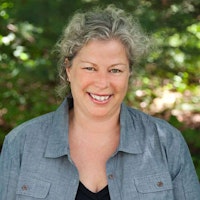While my father [Robert Rodale] was still alive, I was working with him on sketching out the philosophy of regeneration based on the process of healing…
Maria Rodale

The Idea of Regeneration
Topic: Society & Civil Religion
While my father was still alive, I was working with him on sketching out the philosophy of regeneration based on the process of healing in the soil as the land transitions from chemical to organic, which scientists were observing on the Farming Systems Trail at the Rodale Institute. We applied the idea not just to agriculture, but to communities, personal health, and spirituality, as well. Together, we created a document called The Seven Tendencies of Regeneration.
Maria Rodale, born on January 24, 1962, in Pennsylvania, is a notable advocate for environmental sustainability and organic farming. She graduated from Muhlenberg College with degrees in Communications and Art, which have influenced her leadership as the former CEO and Chairman of Rodale Inc., a publisher dedicated to health and wellness. Her commitment is deeply rooted in her family's legacy, particularly her father Robert Rodale's advocacy for regenerative organic agriculture.
Maria has been instrumental in promoting sustainable farming practices through her work at the Rodale Institute, where she has championed methods that mitigate the negative impacts of pesticides and industrial agriculture. Her efforts contribute to broader environmental goals, including combating climate change. Recognized for her dedication, Maria has received several prestigious awards, such as the National Audubon Rachel Carson Award and the United Nations Population Fund’s Award for her contributions to environmental health and safety.
Beyond her executive and advocacy roles, Maria is an author of titles like Organic Manifesto and Shamanic Journeys into the Heart of My Garden, reflecting her deep connection to nature. She is also a mother, grandmother, artist, and passionate gardener, residing close to her birthplace in Pennsylvania. Through her various roles, Maria continues to support the dialogue on sustainable living and the importance of organic practices.
Rodale, Maria. "Robert Rodale and The Healing Power of Regenerative Organic Agriculture." HuffPost, 30 Sept. 2015, updated 6 Dec. 2017, www.huffingtonpost.com/maria-rodale/the-healing-power-of-rege_b_8172286.html.

Maria Rodale
Theme: Regenerative Economics

About This Maria Rodale Quotation [Passage Excerpt]
September 20, 2015 marked 25 years since my father, Robert Rodale, was killed in a car accident in Russia. If on that fateful day someone would have asked him what his legacy was to be, I know for a fact he would have answered: “Regenerative organic agriculture.”
To him, organic alone was not enough. He believed we needed a commitment to making things better. But more importantly, he understood that nature inherently makes things better when left to do her work. Nature heals itself, just as our bodies inherently attempt to heal themselves when wounded. We needed, he thought, to get nature on our team to make organic agriculture reach its true power.
A lot of people thought he was crazy. But some thought he was onto something.
After he died, the idea of regenerative agriculture seemed forgotten as the organic movement grew. But lately, there has been a resurgence of support behind the idea of regeneration. Thanks to the work of Tom Newmark, with the Carbon Underground, people are gathering around the tribal fire of regenerative organic agriculture in a way that my father would have only dreamed about. There’s even a growing movement toward regenerative capitalism, an idea proposed by the Capital Institute’s John Fullerton.
While my father was still alive, I was working with him on sketching out the philosophy of regeneration based on the process of healing in the soil as the land transitions from chemical to organic, which scientists were observing on the Farming Systems Trail at the Rodale Institute. We applied the idea not just to agriculture, but to communities, personal health, and spirituality, as well. Together, we created a document called The Seven Tendencies of Regeneration.
I dug that document out of the files recently to share with a few people, and thought it would be a great way to honor the 25 years it took from my father’s death until now for the topic of regeneration to finally begin finding a home in people’s hearts and minds.
—Maria Rodale [Robert Rodale and The Healing Power of Regenerative Organic Agriculture].
Robert Rodale and Maria Rodale—Seven Tendencies Towards Regeneration in Agriculture, Communities, and Personal Spirit
1. PLURALISM
Increase in diversity of plant species.
Increase in diversity of businesses, people and culture.
Increase in diversity of personal experiences, capacities, opportunities and openness to new experiences.
2. PROTECTION
More surface cover of plants, ending erosion and increasing beneficial microbial populations near the surface.
More resistance to economic and cultural fluctuations because of quantity and variety of businesses and people, which increases overall employment and community stability.
Improvement of personal hardiness and an ability to withstand crisis, accompanied by a boost in the body’s immune system.
3. PURITY
Without chemical fertilizer and pesticide use a greater mass of plants and other life exists in the soil.
Without pollution of the environment, more people can exist in better health.
By ending detrimental habits such as smoking or thinking negatively, the potential for growth, happiness and success increases.
4. PERMANENCE
More perennials and other plants with vigorous root systems begin to grow.
As businesses and individuals become successful and stable, they can contribute more to the community.
New, more positive, personal spiritual behaviors take root and provide a deeper meaning to life.
5. PEACE
Past patterns of weed and pest interference with growing systems are disrupted.
Former patterns of violence and crime are reduced, improving overall security and well-being.
Negative emotions such as anger, fear and hate lessen in intensity and are replaced by tolerance, compassion and understanding.
6. POTENTIAL
Nutrients tend to either move upward in the soil profile, or to accumulate near the surface, thereby becoming more available for use by plants.
“Trickle up” economics more resources and money accumulate and are more available to more people.
The positive qualities and resources in yourself and your environment become easier to access and effect more people around you.
7. PROGRESS
Overall soil structure improves, increasing water retention capacity.
Overall community life improves, increasing the health and wealth of its inhabitants.
Capacity for well-being and enjoyment increases.
—Maria Rodale [Robert Rodale and The Healing Power of Regenerative Organic Agriculture (7 tendencies regeneration)].
Resources
Related Quotes
Copyright © 2017 – 2025 LuminaryQuotes.com About Us